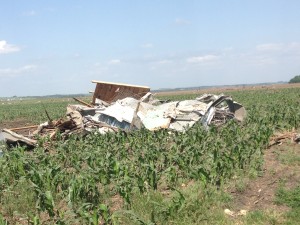Severe Weather Patterns Challenge Nebraska Farmers

Debris in field from the Pilger, Nebraska Tornado.
It’s severe weather season in Nebraska, and June has not disappointed. Nebraska has seen significant severe weather events over the last two weeks, with the widespread hailstorm that blanketed the area from areas north of Neligh to Norfolk to Blair on June 3rd, and the extreme tornadoes that affected areas of northeast Nebraska early this week. The now infamous June 16th twin tornadoes affected a wide area, causing damage in Stanton, nearly obliterating the town of Pilger, and taking two lives. The very next day, other tornadoes wreaked similar havoc in the towns of Coleridge, Hartington, Laurel, and Wakefield and surrounding rural areas.
With multiple storm chasers on each country mile, the prominence of social media, and a smart phone with amazing camera capabilities in every pocket, these terrifying events and their devastating effects on towns, farms, and fields are now captured in record numbers and reported quickly.
Farmers—and their insurance agents—in these areas have been busy assessing the damage from the wind and hail to their own crops, and are making the sometimes difficult decision of whether or not to replant. If a large percentage of the field is severely affected, then replanting is often the best option, despite the late date. If a plant is severed below the growing point, the plant is dead and will not come out of it. With replanting, many crop experts say that the replanted crops would only yield about 50 to 55 percent of their normal potential at harvest. Good insurance can help greatly with these losses, however, and UNL Extension Crop Economist Cory Walters offers the following tips for qualifying for replanting payment:
- The insured crop must be hit with an insured peril (excess moisture, frost, hail, etc…).
- Your approved insurance provider must determine that it is practical to replant. (This is why it’s best to contact your insurance agent immediately.)
- Acres being replanted must have been initially planted on or after the earliest planting date.
- Appraised expected yield must be below 90% of the guarantee yield on acreage intended for replant.
- Acreage replanted must be at least the lesser of 20 acres or 20% of the insured planted acreage for the unit.
- Approved insurance provider must give consent to replant.
Making these decisions can be challenging, but the sooner a plan can be made and implemented, the better.
Our own UFARM area land managers report varying degrees of damage in their areas.
UFARM Land manager Jeff Frack, who is based in the Lincoln office says, “I am lucky, in that all of the crops on the farms I manage look great. We have had plenty of rain, and fortunately missed all of the hail. [We are] a week to 2 weeks later than normal planting, but not late enough to be a concern.”
UFARM Operations Manager Chris Scow, also based in the Lincoln office reports, “I would have a very similar report to Jeff’s earlier comments, [as] I mainly travel the same vicinity in which Jeff manages farms. I did, however, have the occasion to travel up to Oakland, NE yesterday. We traveled up Highway 77, as Oakland is approximately 30 miles north of Fremont. As we drove through the area around Uehling, NE, I’d have to say I’ve rarely seen hail damage as significant as what that area experienced. Many fields had recently been, or were currently being replanted. Those that had not been replanted had very few plants still standing, or even visible, in them. There was not a single leaf left on the trees; they looked like they were in the middle of winter. Houses had windows boarded up and significant damage to siding, roofs, etc.”
UFARM manager Randy Oertwich, based in the Norfolk office has been evaluating farms from Chapman to Scribner, and says that some farms were being replanted last week.
If you have questions or concerns about the state of your fields, and need advice on the options available to you after a severe weather event, please feel free to give us a call at 402.434.4498.
United Farm and Ranch Management (UFARM) is a Nebraska-based company devoted to meeting landowners’ needs. UFARM offers a full range of Nebraska land management services, including real estate sales, rural property appraisals, consultations and crop insurance. UFARM has operated in Nebraska since the early 1930’s.
Sources: Walters, Cory. “Crop Insurance and Replant Decisions.” CropWatch. University of Nebraska-Lincoln. 15 May 2014. Web. 19 Jun. 2014.

